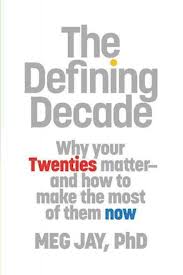Author(s): Meg Jay, PhD
ISBN: 987-0-446-56176-1
APA Style Citation
Jay, M. (2012). The defining decade: why your twenties matter and how to make the most of them now. New York: Twelve.
| open_your_classdefining_decade.pdf |
The Defining Decade: Why your twenties matter and how to make the most of them is an insightful and research based examination of how the decisions one makes during their twenties have enormous impact on happiness and success later in life. The author, Meg Jay, PhD is a clinical psychologist with a private practice and a University of Virginia professor. The book is a mix of development, personality, and neuroscience research related to early adulthood. The book addresses how the important choices individuals make regarding careers and friendships during their twenties can have long-term ramifications. Although the book is written for individuals in their twenties, it can certainly helpful for high school students.
The book opens with a quote from linguist Noam Chomsky, “Almost invariably, growth and development has what’s called a critical period. There’s a particular period of maturation in which, with external stimulation of the appropriate kind, the capacity will pretty suddenly develop and mature. Before that and later than that, it’s either harder or impossible.” Dr. Jay considers one’s twenties an example of a developmental critical period because eighty percent of the events which define one’s life (careers, relationships, education, parenthood, etc.) occur before the age of thirty-five. This book encourages twentysomethings to think seriously about the decisions they are making or putting off. Research shows that during one’s twenties most of a person’s lifetime wage growth occurs which makes thinking critically about one’s career during this decade vital. It is during this critical period that career paths are determined and decisions regarding marriage and family are often made. This period is biologically defined by the final stage of brain growth in the development of the prefrontal cortex, which contributes to the importance of this time period.
Much of the book focuses on paths to career development during one’s twenties such as developing identity capital and utilizing weak ties. Identity capital, a term used by sociologists, refers to the outcome of the investments individuals make in themselves which can be used like currency to advance careers and find healthy relationships. Identity capital includes education, work experiences, and specific achievements, but it also involves appearance, who we know, interests, and personality traits. These collective experiences, traits, and achievements determine what we have to offer in the career marketplace and should be carefully considered during one’s twenties because about two-thirds of lifetime wage growth occurs during the first ten years of a career. The book also encourages individuals in their twenties to utilize weak ties, a term coined by Stanford professor Mark Granovetter as a result of his research into social networks (decades before online social media). Granovetter found that close friends and family were not the individuals who proved most helpful in job searches and career advancement. Surprisingly, more than three-quarters of new jobs or major advances in career development were the result of contacts that individuals saw only rarely. Weak ties include classmates and coworkers you do not know well, friends of parents, or former acquaintances. One’s closest ties consist of individuals who are most likely very similar to us and thus unlikely to be able to provide new and different opportunities. Weak ties conversely are more likely to be individuals we do not know very well (or at all) and are very different from us which can generate truly unique opportunities.
According to Dr. Jay, “Claiming your twenties is one of the simplest yet most transformative things you can do for work, for love, for your happiness, maybe even for the world.” The Defining Decade provides evidence from numerous research studies to provide insights which will help individuals in their twenties make the best possible decisions for future happiness and success in many aspects of their lives including the following.
· Career success takes time: according to research by K. Anders Ericsson this means 10,000 hours (this is also covered in Malcolm Gladwell’s book Outliers). Twenty-something individuals should be reminded that it might take about five years of full-time work in their new career before they develop mastery and full confidence.
· Personality changes more in one’s twenties than at any other time. The twenties represent the final period of development for the frontal lobe and behaviors and personality patterns become hardwired for adulthood. This is the time to change what you want to about yourself.
· Romantic relationships are important and the adage that “you cannot choose your family but you can choose your friends” is incorrect because it is during ones twenties that you in fact do choose a family. According to Dr. Jay, “The best time to work on your marriage is before you have one.” Invest the same amount of attention and planning in your romantic relationships as you do for your career because decisions in this area have dramatic and long-term impact on your personal happiness and life satisfaction.
Other Related Resources
Meg Jay, Ph.D. – TED Talk
Dr. Jay’s 2013 TED talk “Why 30 Is Not the New 20″ which has been viewed more than 2 million times.
http://www.ted.com/talks/meg_jay_why_30_is_not_the_new_20.html
NPR Podcast
This seven minute podcast from Chicago Public radio includes a short interview with author Dr. Jay and impromptu conversations of twentysomethings on the campus of George Washington University.
http://www.npr.org/2012/04/22/150429128/our-roaring-20s-the-defining-decade
The Year 25 Series
NPR created a series of interviews called the Year 25 series in which they interviewed several famous individuals about what was happening in their lives when they were twenty five.
http://www.wbez.org/series/year-25
Chicago Mayor Rahm Emanuel at age 25 from the Year 25 Series.
http://www.wbez.org/series/year-25/who-was-25-year-old-rahm-emanuel-108327
Psychological Figures and Concepts
Albert Bandura
Carol Dweck
Erik Erikson
Phineas Gage
Daniel Gilbert
Karen Horney
Adolescence
Big five personality traits
Critical periods
Emerging adulthood
Frontal lobes
Happiness
Identity
Mindset
Neuroticism
Plasticity
Self-efficacy
Similarity and attraction
Ten thousand hours

 RSS Feed
RSS Feed